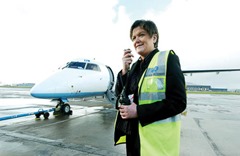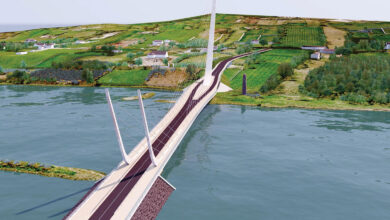Careers agenda Louise McCutcheon
 George Best Belfast City Airport duty manager Louise McCutcheon discusses her busy front-line job and the satisfaction of serving passengers.
George Best Belfast City Airport duty manager Louise McCutcheon discusses her busy front-line job and the satisfaction of serving passengers.
Please outline your career path to date.
I had been working in London and came back to Belfast with the intention of only staying for a short period of time. At home, I met up with a family friend, working in Belfast City Airport at the time, who told me about a vacancy in an airport shop. He absolutely loved working there and I had always wanted to work in an airport so jumped at the chance to apply for the role.
I got the job and the fantastic atmosphere amongst employees helped me settle in to life at the airport very quickly. That was over 20 years ago and I have now been duty manager for the last 13 years. There is always a buzz about the airport which makes coming to work extremely enjoyable.
What is the best job description for an airport duty manager?
As one of four duty managers working on a shift pattern, I have responsibility for all areas of the airport and am also the central contact for customer liaison. The duty manager’s role is to monitor and ensure the airport is operating at the highest standards of safety and security.
It is essential that we have at least one duty manager at the airport during opening hours to ensure passengers have all the information they need to enjoy their journey through the airport. As duty manager, it is also my responsibility to provide knowledge, support and assistance to the 1,500 staff members we have working on site at the airport each day.
The duty managers work closely with the airlines and ground handling agents to monitor performance and discuss any aspects of operations that we feel could be improved to further enhance the passenger experience. It is important that all procedures and systems in place service the needs of our customers.
In addition to our airlines, we have a number of other tenant companies that a duty manager will work closely with, such as catering, retailing, car hire, engineering and maintenance, that are an essential part of any effective and efficient airport operation.
As a key touchpoint for airport staff, who are spread across airside and landside sites, I also chair the airport’s people forum meetings which provide a conversational platform between the airport’s executive team and staff with regards to airport operations and business developments.
Can you describe a typical working day?
I don’t have a ‘typical’ day as such, which I find one of the most enjoyable aspects of my job. From the minute the airport doors open, anything can happen and we have to be prepared for all scenarios.
From welcoming the Olympic Flame with the First and deputy First Ministers and Mary Peters, to facilitating an airport tour for our adopted schools, to taking part in staff challenges to raise money for our charity partners, it is my responsibility to ensure these events can take place without disrupting the airport’s overall operations.
Each day, I have to perform a number of checks to ensure all areas of the airport are operational, from the toilets to the baggage belts, and ensure staffing levels are sufficient at each station.
The only thing ‘typical’ about each day is that it will be extremely busy and I can certainly never complain about being bored.
What are the most enjoyable and challenging parts of the job?
The fact that a typical day is very rarely an option is a really enjoyable part of the role. With more than 2.3 million passengers using the terminal each year, it’s a very social job which I thoroughly enjoy.
We have a great mix of business and leisure passengers who fill the airport with adrenaline and excitement creating a friendly, welcoming atmosphere. Our customers are very loyal and having got to know many of them over the years, it’s great to see them choosing Belfast City Airport time and time again. With so much going on around you, some may find staying focused a challenge but I strive in a busy setting.
What skills are important for the job?
Good interpersonal and communication skills, patience, understanding and genuine interest in people and their well-being.
Having responsibility for a whole spectrum of activity within the airport and dealing with various external organisations, you have to be extremely organised and process-driven. A lot can change over the course of a shift and you have to be able to think on your feet and adapt very quickly whilst putting your multi-tasking skills to the test to keep operations running as smoothly as possible.
What is unique about working in an airport?
The airport is used by so many people and it has given me the opportunity to meet a number of VIPs from members of the royal family to world statesmen and sports stars such as Rory McIlroy. Last summer, the airport welcomed many delegates of the G8 conference, including current President of the United States Barack Obama, which was really exciting to be a part of.
As the only airport in Northern Ireland to operate a direct service to London Heathrow, which provides unrivalled connectivity to the rest of the world, we have seen more and more VIPs and celebrities using the airport in recent years. Sometimes, however, seeing the excitement of a family heading off on their holidays is better than meeting any amount of famous people.
Aside from that, the airport has a number of adopted schools from the local area that often frequent the terminal for events or tours, and it’s brilliant to see how excited and enthusiastic they are to see and hear more about the airport and what we do here.
How do you relax in your free time?
Working shifts means I am never tied to a specific routine which provides me which flexibility in my free time.
I love spending time with my friends and family. Living in East Belfast is perfect for me as it is close to work but also to the city centre. I also enjoy travelling, which is almost part of the job! It would be difficult to work in an airport and not want to be jetting off for a week or weekend break, particularly in the summer or autumn months when our direct European routes operate until the end of October.





